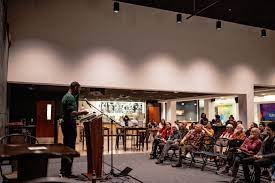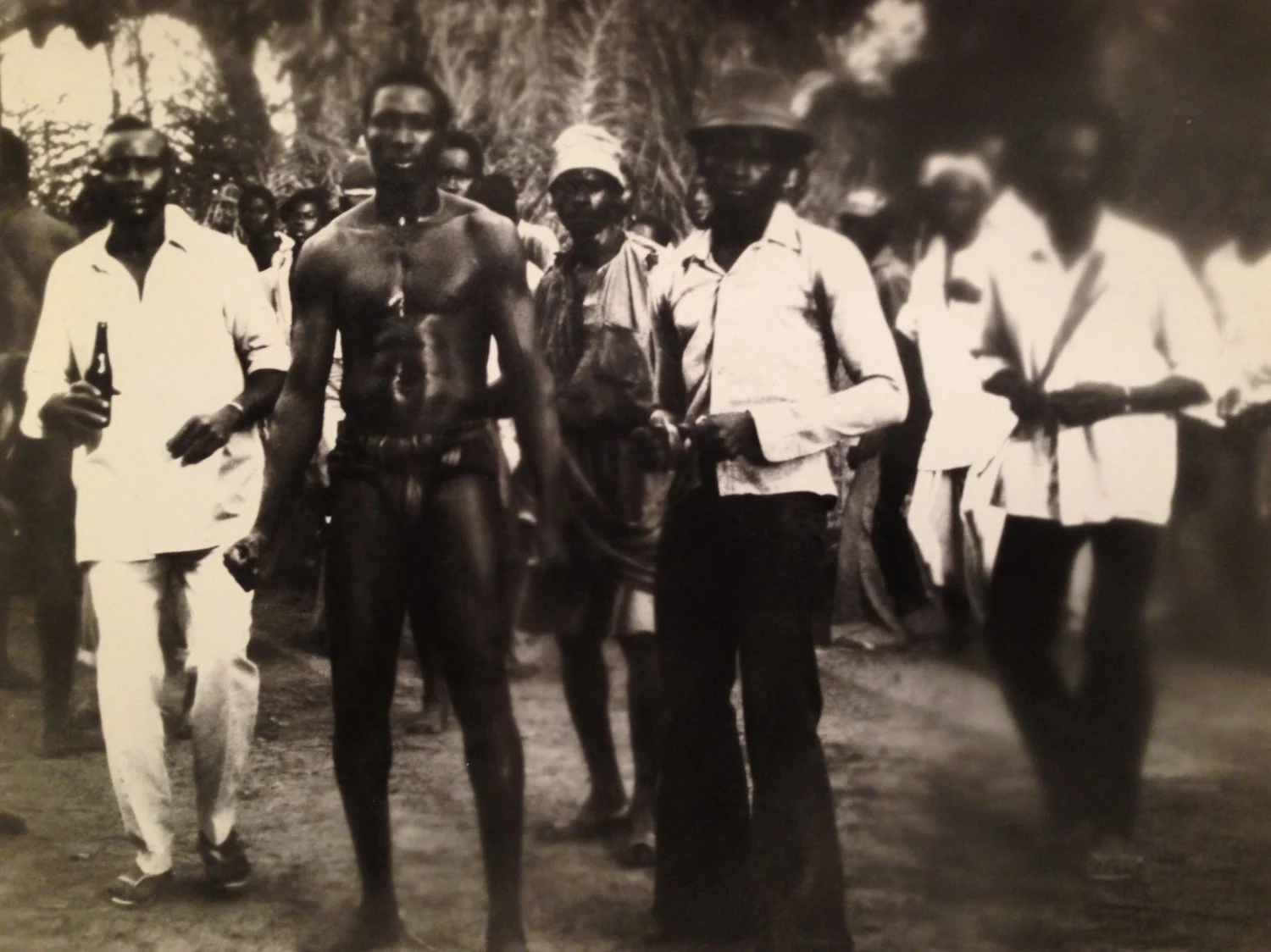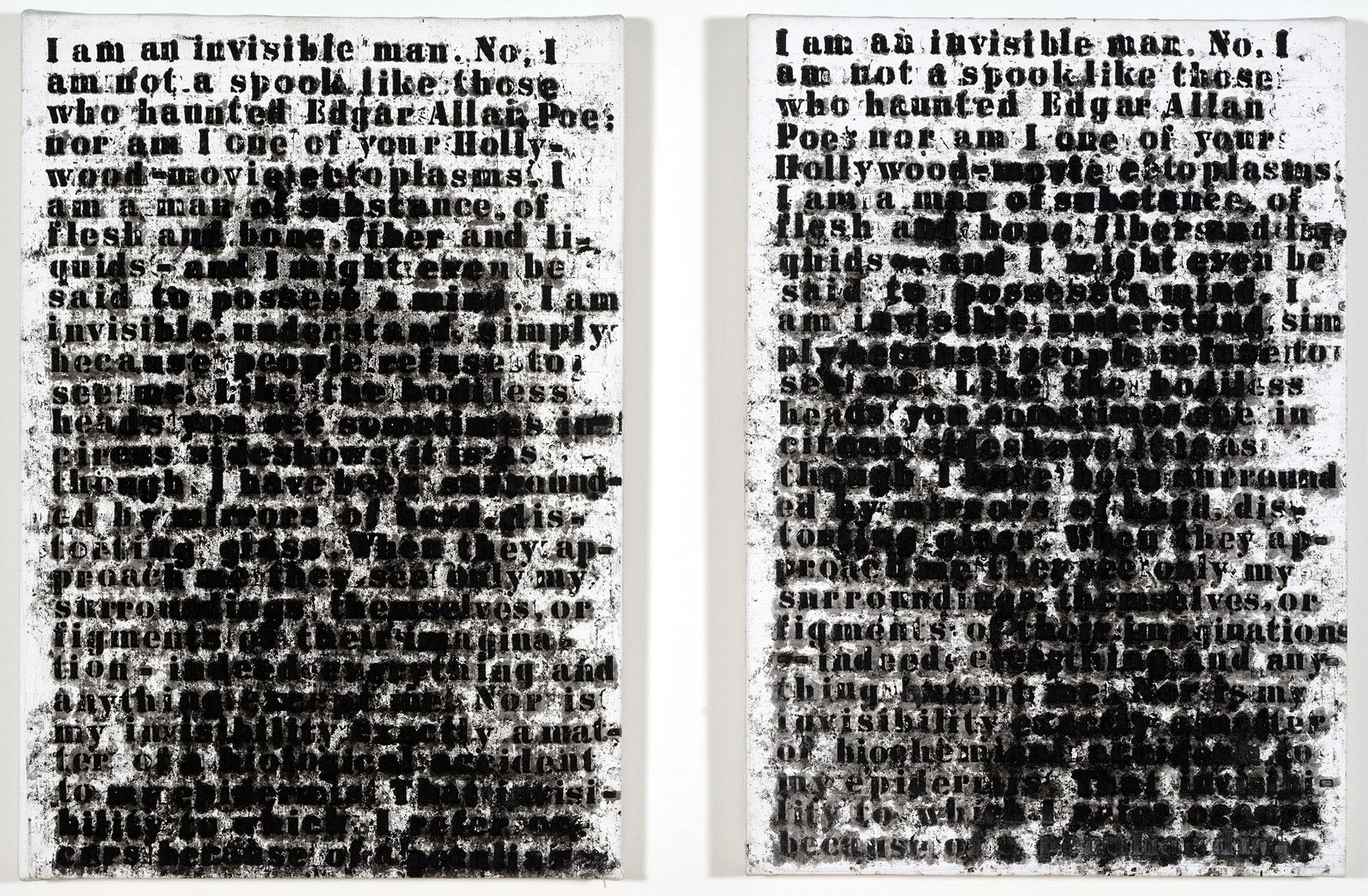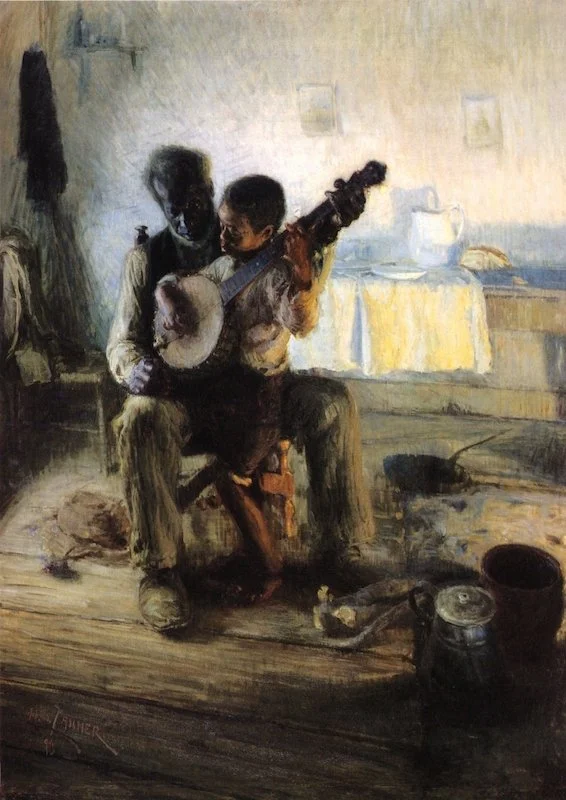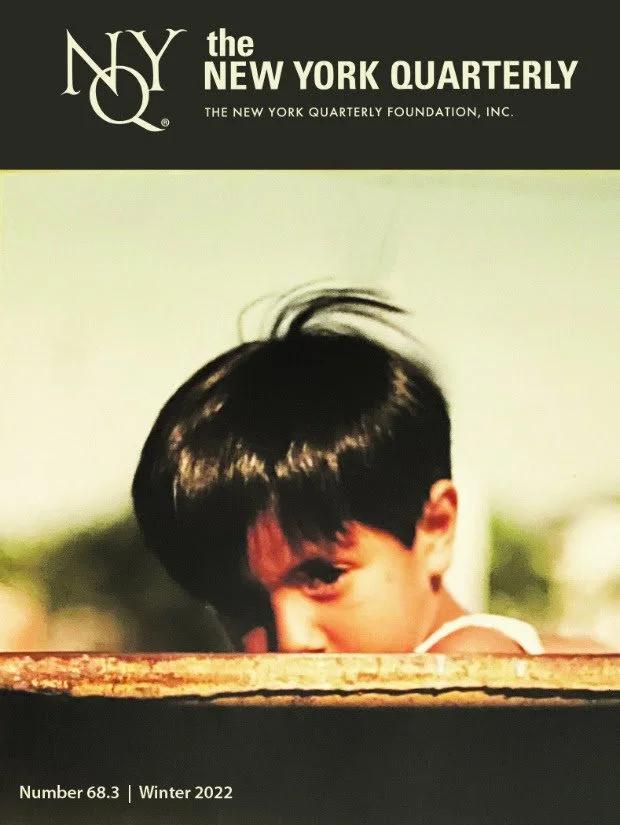My ekphrastic poem “Breach” is after the Alison Saar sculpture by the same name and was recently published in The Prose Poem.
“Okonkwo returns to Umuofia” at Menino Arts Center
My poem “Okonkwo returns to Umuofia” was on display as part of the Menino Arts Center’s exhibit Images Then Words (January 9 – February 14, 2025), which featured the work of 53 Word Artists responding to 61 pieces by 47 Image Artists. Images juried & curated by Sasja Lucas. Words curated by Holly Guran. View the virtual 3D gallery here.
“Okonkwo returns to Umuofia” is a doubly ekphrastic work, responding both to Sasja Lucas’ The Wrestling Match (pictured below) and Chinua Achebe’s novel Things Fall Apart.
Sasja Lucas
The Wrestling Match
120mm film photography
8 x 10 in (h x w)
Okonkwo returns to Umuofia
seven years was a long time to be away from one’s clan,
but he would return to his fatherland and fan his fame—
a bush-fire beneath the stiff harmattan wind. he had a plan:
reclaim his land, rebuild his compound, regain his titles and place
among the egwugwu. but Okonkwo was not prepared
for what he found. his motherland was good to him in exile,
kind. but Mbanta was not filled with warriors. they were weak.
how else could they fall from the grand, old ways—the bonds
of kinship—and allow an abominable religion to fester
like an un-lanced boil or an untreated bout of iba? his Umuofia
was feared by her neighbors, known for her power in war
and in magic. her priests and medicine men possessing
the most potent rites and fetishes, the shrine of agadi-nwayi
among them. thus Okonkwo could not believe Obierika’s reports
of home. but by the second market week back, he began to see
the truth. how his brothers strut across the village square
in white shirts and dusky trousers, abandoning the loincloth
and wrappers worn since the founder of the clan engaged a spirit
of the wild for seven days and nights. how his kinsmen drink
palm wine tapped in Umuru from glass bottles, their gourds
and skulls gathering dust on their obi walls. how titled men
allow themselves to be dragged by kotma to the white man’s court,
to be beaten by his perverted justice. how even some elders dance
to the rhythm of the white man’s religion, deaf to the ekwe
and ogene talking across villages, across the clan’s history.
how supposed men stride—hatted heads held high—to and from
their abomination, their church, in the Evil Forest, believing
their Jesu Kristi will save them from the wrath of Ekwensu and Ani,
Amadiora and Chukwu. it was easier when the converts were only
efulefu—sheaths taken into battle, machetes forgotten at home,
the excrement of the clan lapped up by this mad-dog faith. but now
even Ogbuefis have severed their anklets, become as agbala, to join
the Christians’ meager feast of their god-man’s murdered body.
something must be done. but surrounded by so many such as these…
as cold water poured on a roaring fire, he stifles a sorrow, a grief
he has not known since the last days of the son whose name will not
be remembered in the clan and the one who will. his fist aches,
reflexively clenching around the machete resting inside his obi door.
he will shake out his smoked raffia shirt, examine his feathered headgear
and shield to satisfaction. he turns for home as if on springs, heels
hardly touching the ground. as the elders say,
whenever you see a toad jumping in broad daylight,
know that something is after its life.
Two poems in Lily Poetry Review
I am very proud that two of my ekphrastic poems were published in the latest issue of Lily Poetry Review , guest edited by Anthony Walton and Heather Treseler.
"The Most Dangerous Game" is after a poem by Candice Kelsey (and the short story) of the same name
“La Voix du Silence" is after a painting by Rene Magritte of the same name.
"...could abash the little bird" in The New Verse Review.
My poem “…could abash the little Bird” was published in the inaugural issue of The New Verse Review.
It’s an ekphrastic poem based on Emily Dickinson’s '“‘Hope’ is the thing with feathers…”., with a MEH twist.
Two poems in Anti-Heroin Chic
I am excited to have two of my “when asked…” poems published in the latest issue of Anti-Heroin Chic:
"when asked why students come to me, ‘the tough teacher, the hard grader’”
and
"when asked why you won’t be invited back to the BBQ"
The poems I never read in public (a virtual reading from said the Frog to the scorpion)
I don’t read longer poems at poetry readings. However, I composed some of my longest poems in said the Frog to the scorpion. Months ago, I made an intention to record these poems because I slaved over them and wanted my physical voice attached to them as they are to the poems I read aloud regularly.
So here is a 13 min reading of longer poems from said the Frog to the scorpion
Poems:
1. "when asked why I believed Her"
2. "who She is" (I screwed up the title in the video)
3. “when asked about toxic amnesia”
4. “take your pick”
5. “when asked why I won't”
And yes, there are a lot of squirrels behind me...
"Paulie's War" published in Mid-Atlantic Review
After writing and revising for well over a decade, I am happy that my poem “Paulie’s War” has been published in Mid-Atlantic Review.
"the Blue Envelope Program" published in The New Verse News
I don’t watch or read the news as much as I should. Probably because this is my mind goes when I do. That said, my poem “the Blue Envelope Program” was just published by The New Verse News
For those who want the footnotes I cut out of the poem:
"How to Tell a Pure Rage Story" at Mayday Magazine
I keep writing creative nonfiction and (for some reason) people publish it. “How to Tell a Pure Rage Story” pays homage to Tim O’Brien's “How to Tell a True War Story,” but is a tale all its own.
It's now published in Mayday Magazine.
A five minute reading for Black History Month, Valentine’s Day, and my new collection
In honor of Black History Month, Valentine’s Day, and the publication of my new collection, here is a five minute reading from said the Frog to the scorpion and one other poem.
Poems read in the video (the first four appear in said the Frog to the scorpion):
Hevel
when asked what it’s like to love Her
at some point
Three poems in The Decolonial Passage
My first publications of the new year are from the Decolonial Passage. Each is an ekphrastic work, which will likely be a part of the collection I am slowly putting together. Read them here.
“reflection” is after James Barnor’s Self-Portrait with a Store Assistant at the West African Drug Company, 1952
“Black Men and Women in a Tavern,” is after the painting by the same name from workshop of David Teniers the Younger (1650)
“casually and casualty share a Latin root” draws from Jackie Sibblies-Drury’s Pulitzer Prize winning play, Fairview.
A Boston Tea Party poem in The New Verse News
Today is the 250th anniversary of The Boston Tea Party. My poem, “on watching a reenactment of the boston tea party” was published in The New Verse News.
Two 'Letters to America' in Terrain.org
Demien DineYazhi’s My Ancestors Will Not Let Me Forget This, 2020. Letterpress Print
Terrain.org has published both "when asked what might finally lead me to drink or abuse schedule 1 narcotics" & "white History Month" as a part of their Letter to America series.
Both are accompanied by a “dramatic reading.” Click below to read/listen.
"Invisible Man (Two Views)” - Alan Squire Publishing Annual Poetry Contest
My poem "Invisible Man (Two Views)” was shortlisted in Alan Squire Publishing Annual Poetry Contest and is now in ASP Bulliten’s latest issue.
Invisible Man, Glenn Ligon
This is a doubly ekphrastic poem, inspired by Glenn Ligon’s canvases (by the same name), who in turn took his inspiration from Ralph Ellison’s novel of the same name. Both Ligon and my work represents the opening paragraphs of Ellison’s work to great effect.
So I’m standing on the shoulders of giants. Black excellence.
"Inscrutable" Nominated for a Best of the Net Award
My creative nonfiction essay “Inscrutable” was nominated by Redivder for a Best of the Net Award.
This is my first time being nominated for my prose.
"American Civics: 2056" published in River Heron Review
My poem “American Civics: 2056” was published in River Heron Review’s Poems, For Now issue.
This is an erasure poem from American Civics: A Text Book for High Schools, Normal Schools, and Academies (1906), employing the only mentions of Blacks (“Negroes” or “slaves”) in the whole textbook.
It’s pretty much what you would think and has implications for our collective future.
Fevers of the Mind Poetry Showcase
As a few people are aware, one of the projects I'm currently working (yes, I said “one of…"“) is a collection of ekphrastic poems: I’m expanding Dust & Ashes into a full-length collection.
To that end, I've spent a good part of the summer visiting a bunch of art museums in three different states (so far) to balance the literary art responses with some visual art. Some fruits of that labor were published today in Fevers of the Mind. Here is the link to the poems:
Below are the links to the works they are based on (each opens in a new window).
Solstice Literary Magazine Stephen Dunn Poetry Prize winner!
Well I can finally announce that my poem “the Banjo Player explains” was chosen by A Van Jordan as the Solstice Literary Magazine Stephen Dunn Poetry Prize winner!
The poem is an ekphrastic narrative based on Henry Ossawa Tanner’s painting The Banjo Lesson: the painting which was the cover art for my first collection, Teaching While Black.
It’s a joy to present the selections for the 2023 Stephen Dunn Prize for poetry. The winning poem is “the Banjo Player Explains,” by Matthew E. Henry, selected by our poetry judge for this issue, A. Van Jordan. He writes:
In one of the most assured ekphrastic poems I’ve read in some time, ‘the Banjo Player Explains,’ grants a wish I’ve had since I first saw this Tanner painting: ‘I wish I could hear this lesson played out.’ The poem goes beyond the canvas and the framing of the two figures by “striking a balance between two worlds,” indeed. There’s also the perspective of experiential knowledge of the boy as man, an old man, looking back on a moment he will never forget, yet not initially knowing the significance of it in the moment. There’s great wisdom and a life lesson here.
[Say Jesus were not your magic negro—] in New York Quarterly
[Say Jesus were not your magic negro—] was published today in New York Quarterly. This poem is a part of the series found in The Third Renunciation.
